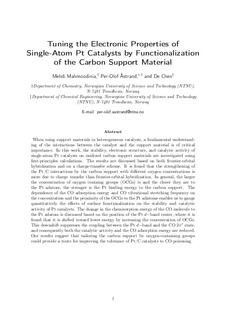| dc.contributor.author | Mahmoodinia, Mehdi | |
| dc.contributor.author | Åstrand, Per-Olof | |
| dc.contributor.author | Chen, De | |
| dc.date.accessioned | 2017-11-17T11:59:18Z | |
| dc.date.available | 2017-11-17T11:59:18Z | |
| dc.date.created | 2017-09-28T13:34:14Z | |
| dc.date.issued | 2017 | |
| dc.identifier.citation | Journal of Physical Chemistry C. 2017, 121(38), 20802-20812. | nb_NO |
| dc.identifier.issn | 1932-7447 | |
| dc.identifier.uri | http://hdl.handle.net/11250/2466956 | |
| dc.description.abstract | When using support materials in heterogeneous catalysis, a fundamental understanding of the interactions between the catalyst and the support material is of critical importance. In this work, the stability, electronic structure, and catalytic activity of single-atom Pt catalysts on oxidized carbon support materials are investigated using first-principles calculations. The results are discussed based on both frontier-orbital hybridization and on a charge-transfer scheme. It is found that the strengthening of the Pt/C interactions by the carbon support with different oxygen concentrations is more due to charge transfer than frontier-orbital hybridization. In general, the larger the concentration of oxygen containg groups (OCGs) is and the closer they are to the Pt adatom, the stronger is the Pt binding energy to the carbon support. The dependence of the CO adsorption energy and CO vibrational stretching frequency on the concentration and the proximity of the OCGs to the Pt adatoms enables us to gauge quantitatively the effects of surface functionalization on the stability and catalytic activity of Pt catalysts. The change in the chemisorption energy of the CO molecule to the Pt adatom is discussed based on the position of the Pt dband center, where it is found that it is shifted toward lower energy by increasing the concentration of OCGs. This downshift suppresses the coupling between the Pt dband and the CO 2⇡⇤ state, and consequently both the catalytic activity and the CO adsorption energy are reduced. Our results suggest that tailoring the carbon support by oxygen-containing groups could provide a route for improving the tolerance of Pt/C catalysts to CO poisoning. | nb_NO |
| dc.language.iso | eng | nb_NO |
| dc.publisher | ACS Publications | nb_NO |
| dc.title | Tuning the Electronic Properties of Single-Atom Pt Catalysts by Functionalization of the Carbon Support Material | nb_NO |
| dc.type | Journal article | nb_NO |
| dc.type | Peer reviewed | nb_NO |
| dc.description.version | acceptedVersion | nb_NO |
| dc.source.pagenumber | 20802-20812 | nb_NO |
| dc.source.volume | 121 | nb_NO |
| dc.source.journal | Journal of Physical Chemistry C | nb_NO |
| dc.source.issue | 38 | nb_NO |
| dc.identifier.doi | 10.1021/acs.jpcc.7b05894 | |
| dc.identifier.cristin | 1499723 | |
| dc.relation.project | Norges forskningsråd: 209337 | nb_NO |
| dc.relation.project | Notur/NorStore: nn2920k | nb_NO |
| dc.description.localcode | © 2017 American Chemical Society. This document is the Accepted Manuscript version of a Published Work, locked until 6 September 2018 due to copyright restrictions. It appeared in final form in Journal of Physical Chemistry C, after peer review and technical editing by the publisher. To access the final edited and published work see http://pubs.acs.org/doi/10.1021/acs.jpcc.7b05894 | nb_NO |
| cristin.unitcode | 194,66,25,0 | |
| cristin.unitcode | 194,66,30,0 | |
| cristin.unitname | Institutt for kjemi | |
| cristin.unitname | Institutt for kjemisk prosessteknologi | |
| cristin.ispublished | true | |
| cristin.fulltext | preprint | |
| cristin.qualitycode | 1 | |
